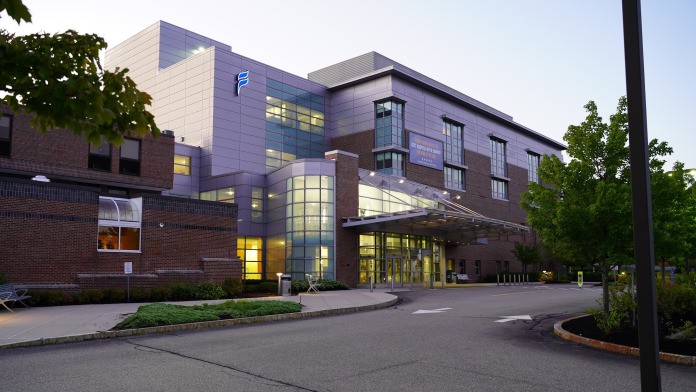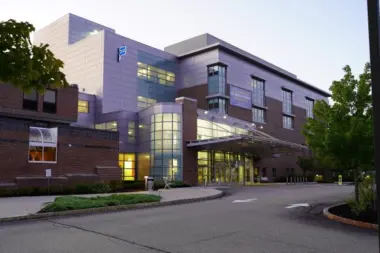Horrible hospital with terrible patient care. GO TO ANY OTHER HOSPITAL, or you will end up regretting coming here. Believe me, I had the worst experience ever, and all I wanted was for them to care about my health.
About Frisbie Memorial Hospital – Geriatric Psychiatric
Frisbie Memorial Hospital – Geriatric Psychiatric is located in Rochester, New Hampshire. Located on the outskirts of downtown Rochester, Frisbie is near several hotels, the Skyhaven Airport, the border of Maine and New Hampshire and the Pickering Ponds Trail.
Located in a larger rural community, there are many natural areas for outdoor recreation and exploration, offering a peaceful time for you to reflect on your sobriety and wellness journey.
Stabilization, Partial Hospitalization and Therapy Programs
As a full-service hospital, their geriatric psychiatric department offers inpatient treatment for those struggling with mental health issues and co-occurring substance use disorders. They will first assess you for your conditions on the first day you arrive for intake.
They also provide partial hospitalization care if you require stabilization or acute care to prepare for the next steps in your treatment. There are no referrals required to enter their geriatric psychiatric care unit for short term treatment.
Structured Healthcare Setting with Flexible Schedule for Care
Programs for treating your conditions are provided in a structured, comfortable healthcare environment. As an intensive outpatient program, you are able to leave the hospital and return to your daily responsibilities, in between treatment sessions. Their PHP also does not require referrals, allowing you to get immediate care for crisis situations.
Therapy Includes Five Sessions Per Day
Group therapy is provided in five sessions per day, which includes time for support group meetings, therapy, education and activities. There is also a break for lunch where you can either enjoy it in their cafeteria, bring your own or eat somewhere offsite.
In addition, there are weekly follow-ups to connect with you and discuss your medications, daily check-ins with their onsite nursing staff and aftercare support. The aftercare team will assist you in planning for any additional treatment you may need following your program’s conclusion.
Facility Overview
Latest Reviews
Rehab Score
Gallery


Accepted Insurance
Other Forms of Payment
Medicaid is a state based program that helps lower-income individuals and families pay for healthcare. Medicaid covers addiction treatment so those enrolled can use their coverage to pay for rehab. When a program accepts Medicaid the client often pays very little or nothing out of their own pocket.
Private insurance refers to any kind of healthcare coverage that isn't from the state or federal government. This includes individual and family plans offered by an employer or purchased from the Insurance Marketplace. Every plan will have different requirements and out of pocket costs so be sure to get the full details before you start treatment.
Self-pay involves paying for treatment out of your own pocket. You can use savings or credit, get a personal loan, or receive help from family and friends to fund your treatment. If you don't have insurance or your insurance plan doesn't cover a specific program, self-pay can help ensure you still get the care you need.
Medicare is a federal program that provides health insurance for those 65 and older. It also serves people under 65 with chronic and disabling health challenges. To use Medicare for addiction treatment you need to find a program that accepts Medicare and is in network with your plan. Out of pocket costs and preauthorization requirements vary, so always check with your provider.
Addiction Treatments
Levels of Care
Outpatient Programs (OP) are for those seeking mental rehab or drug rehab, but who also stay at home every night. The main difference between outpatient treatment (OP) and intensive outpatient treatment (IOP) lies in the amount of hours the patient spends at the facility. Most of the time an outpatient program is designed for someone who has completed an inpatient stay and is looking to continue their growth in recovery. Outpatient is not meant to be the starting point, it is commonly referred to as aftercare.
Residential treatment programs are those that offer housing and meals in addition to substance abuse treatment. Rehab facilities that offer residential treatment allow patients to focus solely on recovery, in an environment totally separate from their lives. Some rehab centers specialize in short-term residential treatment (a few days to a week or two), while others solely provide treatment on a long-term basis (several weeks to months). Some offer both, and tailor treatment to the patient's individual requirements.
Treatments
Many of those suffering from addiction also suffer from mental or emotional illnesses like schizophrenia, bipolar disorder, depression, or anxiety disorders. Rehab and other substance abuse facilities treating those with a dual diagnosis or co-occurring disorder administer psychiatric treatment to address the person's mental health issue in addition to drug and alcohol rehabilitation.
Mental health rehabs focus on helping individuals recover from mental illnesses like bipolar disorder, clinical depression, anxiety disorders, schizophrenia, and more. Mental health professionals at these facilities are trained to understand and treat mental health issues, both in individual and group settings.
Clinical Services
Cognitive Behavioral Therapy (CBT) is a therapy modality that focuses on the relationship between one's thoughts, feelings, and behaviors. It is used to establish and allow for healthy responses to thoughts and feelings (instead of unhealthy responses, like using drugs or alcohol). CBT has been proven effective for recovering addicts of all kinds, and is used to strengthen a patient's own self-awareness and ability to self-regulate. CBT allows individuals to monitor their own emotional state, become more adept at communicating with others, and manage stress without needing to engage in substance abuse.
Whether a marriage or other committed relationship, an intimate partnership is one of the most important aspects of a person's life. Drug and alcohol addiction affects both members of a couple in deep and meaningful ways, as does rehab and recovery. Couples therapy and other couples-focused treatment programs are significant parts of exploring triggers of addiction, as well as learning how to build healthy patterns to support ongoing sobriety.
ECT is a form of treatment in which controlled electric currents are passed through the brain, sometimes causing short seizures. Treatments are done under general anesthesia. ECT appears to change brain chemistry for the better, and has been shown to provide fast and sometimes dramatic improvements in severe mental health conditions that can exist alongside addiction, including depression, bipolar disorder, psychosis, and suicidality. ECT is also often used by those who prefer it to taking medication.
Research clearly demonstrates that recovery is far more successful and sustainable when loved ones like family members participate in rehab and substance abuse treatment. Genetic factors may be at play when it comes to drug and alcohol addiction, as well as mental health issues. Family dynamics often play a critical role in addiction triggers, and if properly educated, family members can be a strong source of support when it comes to rehabilitation.
Group therapy is any therapeutic work that happens in a group (not one-on-one). There are a number of different group therapy modalities, including support groups, experiential therapy, psycho-education, and more. Group therapy involves treatment as well as processing interaction between group members.
In individual therapy, a patient meets one-on-one with a trained psychologist or counselor. Therapy is a pivotal part of effective substance abuse treatment, as it often covers root causes of addiction, including challenges faced by the patient in their social, family, and work/school life.
Trauma therapy addresses traumatic incidents from a client's past that are likely affecting their present-day experience. Trauma is often one of the primary triggers and potential causes of addiction, and can stem from child sexual abuse, domestic violence, having a parent with a mental illness, losing one or both parents at a young age, teenage or adult sexual assault, or any number of other factors. The purpose of trauma therapy is to allow a patient to process trauma and move through and past it, with the help of trained and compassionate mental health professionals.
Staff
John Marzinzik
Chief Executive Officer
Benjamin Fernandes, APRN
Psychiatry
Dr. Jodi Marshall, MD
Psychiatry
Dr. Salud Mendoza, MD
Psychiatry
Contact Information
11 Whitehall Road
Rochester, NH 03867




